Explore Bangladesh’s Ready-Made Garments (RMG) industry, a keystone in the country’s economic boom. Examine the fallout from the Rana Plaza incident, a critical event that sparked demands for reform throughout the world. Navigate the trade agreements between the United States and Bangladesh, the European Union, and Bangladesh, influencing trade, labor rights, and safety regulations. Engage in sustainability and corporate social responsibility programs to demonstrate the dedication to moral behavior.

Stitchery Success: Bangladesh’s RMG sector
So, what is this RMG sector? Bangladesh’s Ready-Made Garments (RMG) industry is vital to the nation’s economy. It is essential to both domestic growth and international commerce. Bangladesh has become one of the world’s top exporters of ready-made clothing over the last few decades, significantly boosting its GDP and creating jobs for millions of people.

A garments factory in Dhaka, Bangladesh
Many factors, including affordable labor, supportive government legislation, and a prime geographic position, have contributed to the rise of the RMG industry in Bangladesh. The sector is now a major force behind economic development, providing women with significant career options and empowering them. The RMG industry employs the majority of women, and their contribution has a groundbreaking impact on Bangladesh’s economic environment.
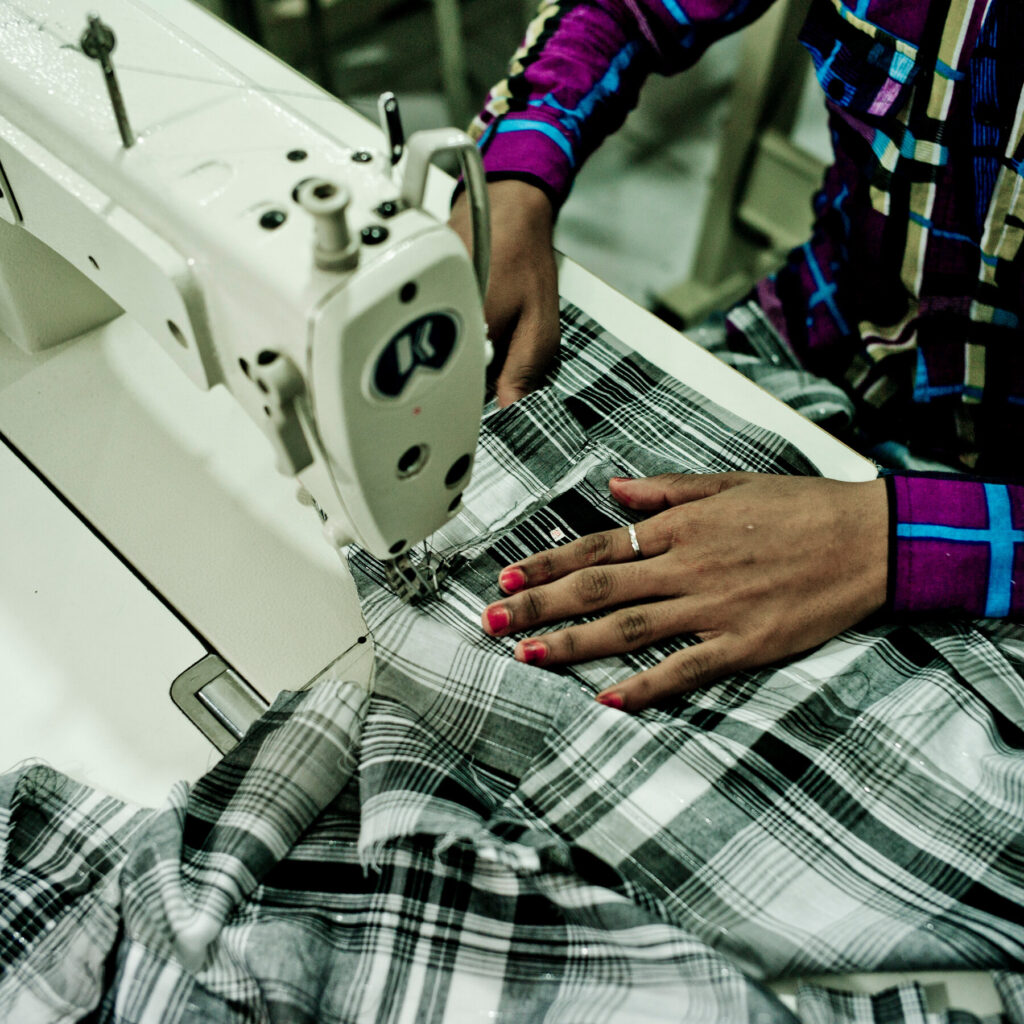
The RMG industry in Bangladesh is constantly evolving to satisfy shifting demands and trends around the world. Its primary concentration was on inexpensive, essential clothing. But now it produces a wide variety of goods for well-known global companies. However, the RMG industry has faced its own share of challenges, such as worker rights, environmental sustainability, and workplace safety.
To learn more about the RMG sector, read: https://www.nytimes.com/2023/04/24/fashion/rana-plaza-anniversary.html
Unfolding the Tragedy: Rana Plaza
The catastrophic Rana Plaza incident on April 24, 2013, serves as an alarming example of the challenges faced by the Bangladeshi (RMG) industry. In Dhaka, multiple garment manufacturers with thousands of workers were situated in the eight-story commercial building known as Rana Plaza. The structure tragically fell, leaving thousands of people injured and over 1,100 people dead.
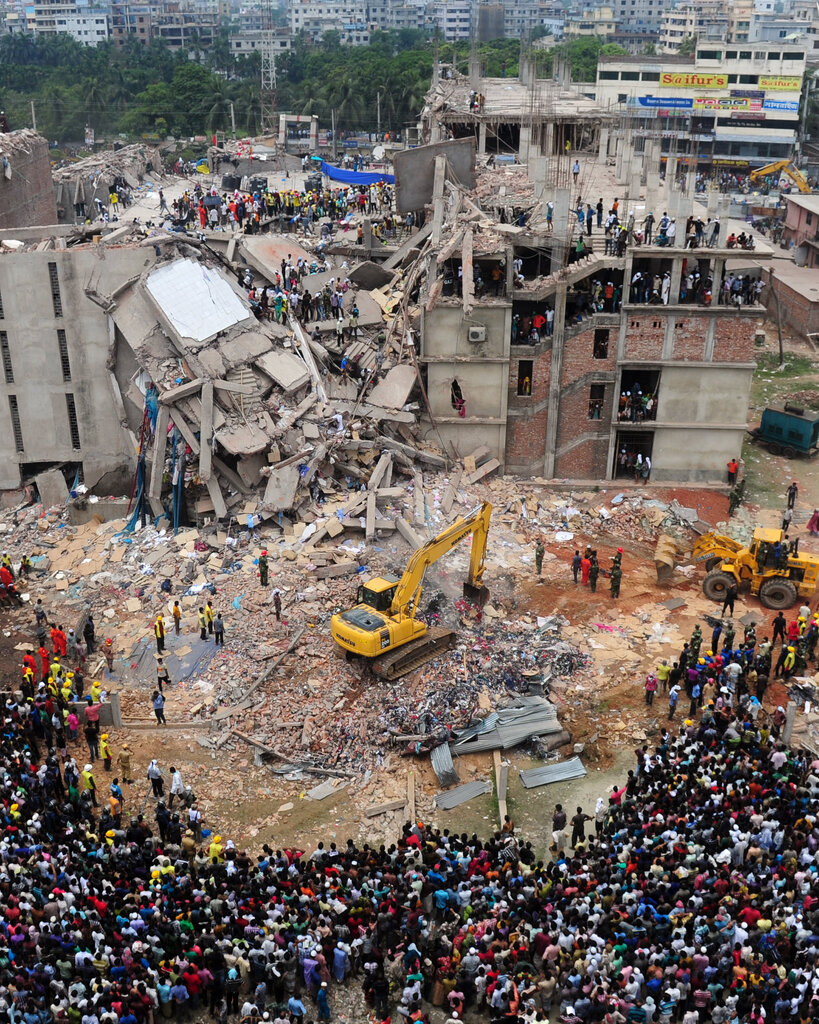
It took 90 seconds for Rana Plaza to collapse in 2013
The event brought to light the serious safety violations and poor working conditions that are common in many of Bangladesh’s apparel manufacturers. It raised awareness of the critical need for industry reforms to protect workers’ welfare on a worldwide scale. Several things contributed to the collapse, including the use of inferior building materials, violations of the building code, and the overabundance of heavy gear on the upper floors.
What happened after the accident?
Following the Rana Plaza accident, there was a worldwide demand for improved garment safety standards and ethical practices. International organizations, brands like H&M, and local authorities came together in reaction to the tragedy. A legally binding agreement between trade unions and brands called the Accord on Fire and Building Safety in Bangladesh was created to assess and address safety hazards for clothing manufacturers. But later, it was replaced by the International Accord Health and Safety in the Textile and garment industry.
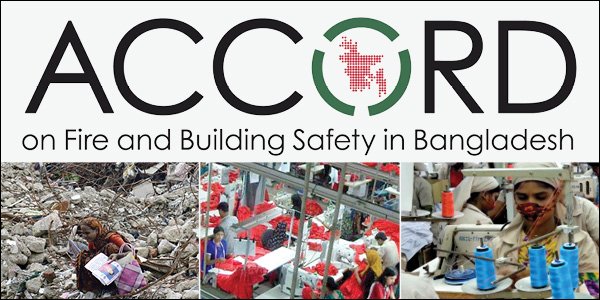
Additionally, the Rana Plaza tragedy raised awareness of and prompted activism for workers’ rights both in Bangladesh and beyond. It emphasized the importance of ethical sourcing and corporate accountability to the world’s supply chain. Customers and brands demand transparency and responsibility in fashion, questioning the origin of goods and prompting industry-wide accountability.
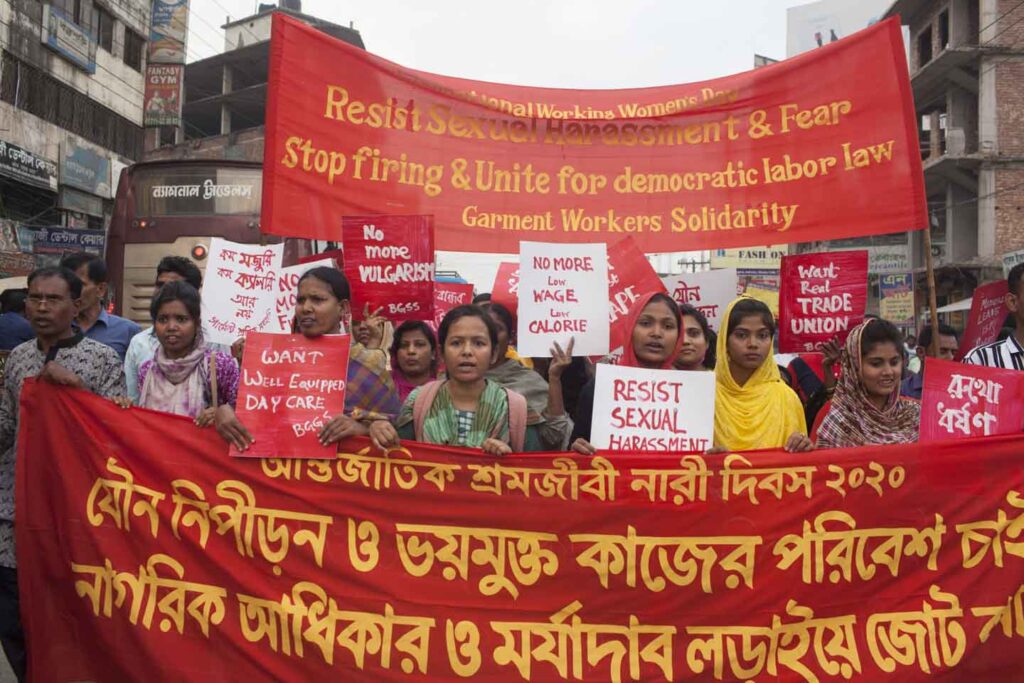
Bangladesh Garment Workers Solidarity observes International Women’s Day. Red Relly at Ashulia, Dhaka Bangladesh 6th March.
Although the collapse of Rana Plaza was a tragic event in Bangladesh’s industrial history. It also acted as an opportunity for improvement and maintaining the codes of Ethics. The event led to a review of safety regulations, worker empowerment, and a dedication to developing a more moral and sustainable apparel sector in Bangladesh and throughout the world.
U.S – Bangladesh Trade Agreements
Bangladesh and the United States have a long history of commerce, with the textile and apparel industries playing a major role. Bangladesh is a significant exporter of ready-made clothing, and one of its main trading partners is the US. The Generalized System of Preferences (GSP), which permits certain developing countries, like Bangladesh, to export specific items to the United States duty-free, is the principal trade agreement that governs this relationship. Therefore promoting bilateral commerce and bolstering Bangladesh’s economic growth.

Trade agreements required to include labor rights and safety requirements, as was becoming increasingly apparent in the aftermath of the Rana Plaza catastrophe. The event exposed the weaknesses in Bangladesh’s apparel sector and underlined the necessity of extensive changes to safeguard workers’ rights and welfare.
Post-Rana Plaza:
After the Rana Plaza catastrophe, the United States and Bangladesh negotiated to reinforce the current trade agreements. Bangladesh’s trade advantages under the GSP program were suspended in 2013, which was a notable move. The goal of the suspension was to press Bangladesh to raise workplace safety and labor standards.

However, it is crucial to highlight that the suspension of GSP did not mean the end of commercial relations. Instead, it functioned as a means of encouraging improvements. In response, the government of Bangladesh improved factory inspections, changed labor regulations, and improved worker safety. In 2015, the United States granted Bangladesh GSP advantages again, acknowledging that the country has made progress in resolving concerns brought up following the Rana Plaza catastrophe.
EU-Bangladesh Trade Agreements
In 1995, Bangladesh became a World Trade Organization (WTO) member. Since then, the European Union-Bangladesh Trade Agreement has played an essential role in creating Bangladesh’s economic landscape.
Bangladesh has the most advantageous regime possible under the EU’s Generalized Scheme of Preferences (GSP) as a Least Developed Country (LDC), namely (EBA). The Everything Except Arms (EBA) policy, which gives Bangladesh duty-free and quota-free access to the European market, emphasizing the textile sector, is an essential component of this economic alliance.
The trade conditions included in the agreement have made it easier for Bangladesh to export textiles to the EU, giving the country access to one of the biggest consumer markets in the world without being restricted by tariffs or quotas.
The impact of the EU-Bangladesh Trade Agreements
More than 90% of Bangladesh’s exports to the EU under this agreement are clothing, a significant part of the country’s exports. The agreement has helped Bangladesh’s textile industry expand and diversify while also making it possible for the nation to become a significant supplier of clothing to customers in Europe. Thanks to its privileged access to the EU market, Bangladesh has invested in technology, innovation, and sustainability within the sector to preserve and improve its competitiveness internationally.
By 2020, trade with the EU was Bangladesh’s largest trading partner, accounting for over 19.5% of the country’s total commerce. This solid economic relation demonstrates how both parties gain from the trade arrangement. Bangladesh has access to a large consumer base in its competitive textile sector, while the EU has advantages by having a varied and affordable supply of apparel.
Moreover, Bangladesh was ranked 34th in terms of products traded with the EU in 2020. In addition to promoting economic expansion in Bangladesh, the EU-Bangladesh Trade Agreement helped stabilize and advance the European Union’s economy.
The Joint Statement between the European Union and Bangladesh
A joint statement released by the EU, the ILO, and the government of Bangladesh. It emphasized the necessity of raising labor standards and ensuring factory safety in Bangladesh’s knitwear and ready-made garment (RMG) industries. The participants acknowledge the industry’s beneficial effects on women’s empowerment, employment, poverty eradication, and economic development. They emphasized the necessity of balanced sector growth that provides safe and secure working environments to support future trade expansion. In the statement, Bangladesh promises to strengthen worker rights through several initiatives. These actions include:
- amending the Bangladesh Labor Law
- complying with ILO guidelines
- creating new legislative proposals to address ILO recommendation
- enhancing collective bargaining and social freedom in Export Processing Zones (EPZs)
- putting worker’s rights, occupational safety, and health education and training initiatives in place.
Bangladesh commits to modernizing labor inspections, creating a public database for factory inspections, and supporting workers affected by recent disasters.
Promises made by the European Commission:
The European Commission promises to encourage skill development through EU development aid and investigate financial options for better working conditions in the RMG sector. Also, assist in the rehabilitation of individuals rendered permanently crippled by the collapse of the Rana Plaza. In addition, the EU promotes ethical business practices for enterprises that purchase clothing from Bangladesh and emphasizes the significance of collaboration and interaction with relevant parties to guarantee the successful execution of safety campaigns.
Bangladesh’s Commitments:
Bangladesh commits to bringing into effect the National Tripartite Plan of Action on Fire Safety and Structural Integrity in the RMG industry regarding building and occupational safety. The process involves assessing the safety of operational factories, implementing corrective actions, and establishing a transparent public database of safety inspections.
Joint Statement Emphasis on Ethical Practices:
The joint statement urges businesses to adopt a standardized code of conduct for factory audits, emphasizing ethical practices throughout the supply chain. It also acknowledges European social partners’ efforts to update the textile and apparel industry’s codes of conduct.
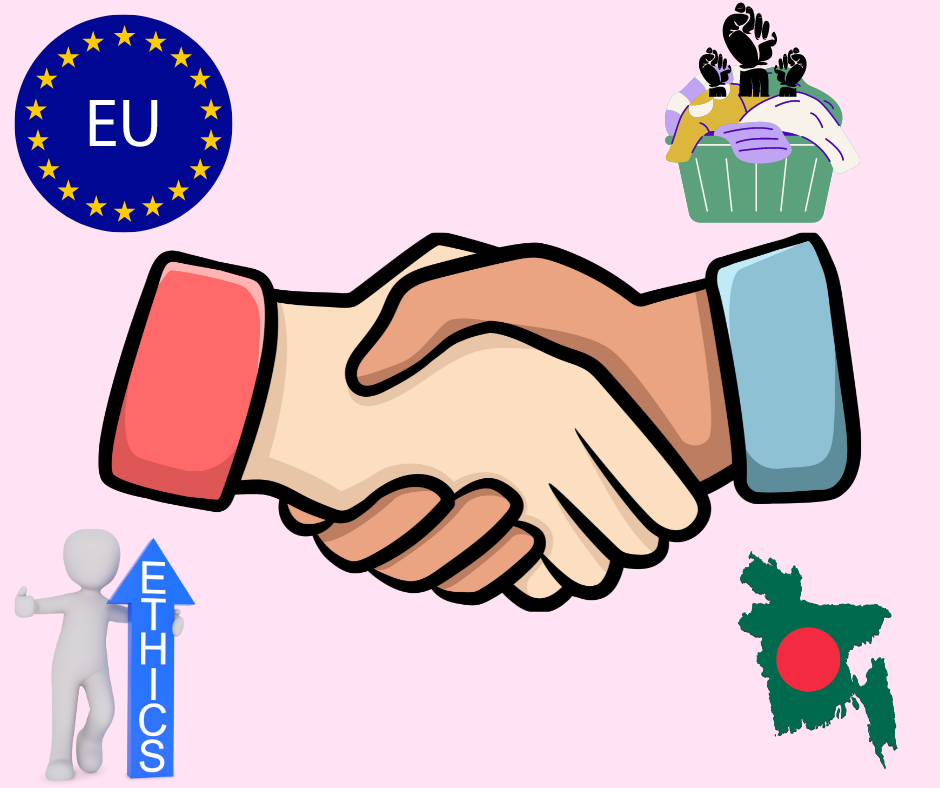
Corporate Social Responsibility (CSR) and Sustainability
In July 2013, the EU initiated the introduction of a Sustainability Compact for Bangladesh. The objective was to improve labor rights and industrial safety in the ready-made garment sector. The project unites the ILO, the EU, the Government of Bangladesh, the USA, Canada, and critical markets for garment manufacturing.
The following three are the interrelated pillars that form the foundation of the Compact:
- respect for labor rights
- structural integrity of buildings and occupational safety and health,
- responsible business conduct.
The Bangladeshi government decided in October 2019 to establish the National Action Plan (NAP) on the Labor Sector. A roadmap that includes deadlines for reforms aimed at enhancing labor rights. These include aligning the Bangladesh Labor Act and the Export Processing Zone Labor Act with the fundamental conventions of the International Labor Organization (ILO). Bangladesh released the NAP in September 2021.
Resources:
International Trade agreements, Bangladesh – Country Commercial Guide, textile and apparel, https://www.trade.gov/country-commercial-guides/bangladesh-textiles-and-apparel
European Union, Trade, EU Trade Relations with Bangladesh, retrieved on December 3, 2023, https://policy.trade.ec.europa.eu/eu-trade-relationships-country-and-region/countries-and-regions/bangladesh_en
Joint Statement, Staying engaged: A Sustainability Compact for continuous improvements in labor rights and factory safety in the Ready-Made Garment and Knitwear Industry in Bangladesh, pdf, retrieved on December 3, 2023, https://circabc.europa.eu/ui/group/09242a36-a438-40fd-a7af-fe32e36cbd0e/library/9f53e48f-96d7-4ba1-b44c-5eba86336ddb/details
U.S Embassy in Bangladesh, U.S. Bangladesh Relation, retrieved on December 5, 2023, https://bd.usembassy.gov/our-relationship/policy-history/bilateral-economic-relations/
Bureau of International Labor Affairs, Labor Rights and Factory Safety in Bangladesh, retrieved on December 5, 2023, https://www.dol.gov/agencies/ilab/trade/preference-programs/bangladesh-gsp
European Commission, The EU market, retrieved on December 5, 2023, https://trade.ec.europa.eu/access-to-markets/en/content/eu-market-0
April 25, 2021, Elizabeth Paton, International brand sign a new accord to protect garment works in Bangladesh, retrieved on December 6, 2023, https://www.nytimes.com/2021/08/25/business/garment-worker-safety-accord.html

